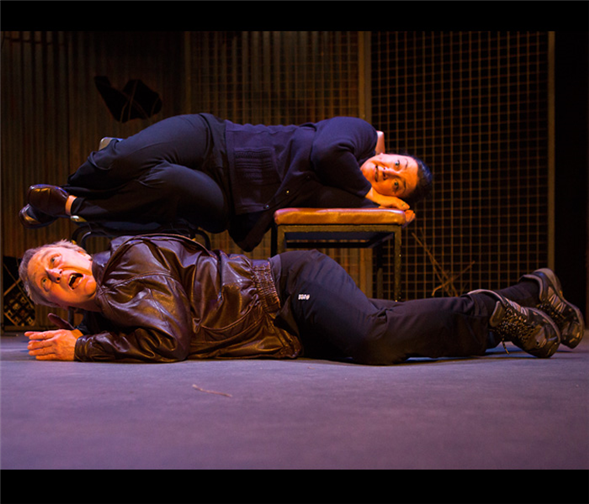Translate Page

New Irish plays rely on firing our minds and imaginations
---
Donal O'Kelly originally envisioned his newest play, Little Thing, Big Thing, as a film. It would be a noir thriller, in the vein of The 39 Steps or The African Queen, and would follow a nun and an ex-con drawn into the corrupt world of Big Oil companies. But it soon became clear the story was better suited for the stage.
"One strength theatre has is it's idea-driven," O'Kelly says. The Irish playwright-actor uses language to paint ideas into his audience's minds; characters describe actions and vocalize sound effects, enabling spectators to fill in the blanks with their own mental images. When a character tiptoes down a creaky staircase, for example, the actors narrate the stage direction and provide rhythmic creaking sounds.
"It's like an imaginary movie in the audience's mind," O'Kelly explains. "There's a kind of participatory demand of the audience. It's like a challenge: 'Do you want to come aboard?' And the audience responds 'Yes' with their imaginations. They create all the images and atmospheres in their own minds' eye."
Just as its characters become enmeshed in plots of corporate intrigue and skullduggery, Little Thing, Big Thing, playing through September 27 at 59E59 Theaters, pulls the audience gradually into its narrative. When Martha, the nun (Sorcha Fox,) and Larry, the ex-con (O'Kelly), rush across Ireland to deliver a roll of film containing sensitive information into the right hands, the audience becomes invested in a world they've constructed in part with their imaginations. Whether the two characters will succeed in exposing massive corruption becomes a personal affair.
"I think there's a kind of political dimension to that," says O'Kelly. "Because it means a participatory involvement with the audience, rather than just consumptive. They're not just consuming images, they're participating in the creation of the images. In society it's far better to think of ourselves as participants rather than consumers."
It's the live performance element that makes the play's politics resonate, according to director Jim Culleton. "The audience is there experiencing the journey with the characters, which does suggest to people they could look at the world differently and perhaps change things as well," he says. As artistic director of Fishamble, one of Ireland's leading new play companies, Culleton has noticed more and more participatory rather than passive theatre, often centered on ordinary people using their voice to do extraordinary things.
{Image1}
The theme extends to other contemporary Irish dramas, including Genevieve Hulme-Beaman's Pondling (also playing at 59E59 as part of the eighth annual 1st Irish Festival), and other Fishamble shows like Underneath by Pat Kinevane and The Pride of Parnell Street by Sebastian Barry. "Those plays tend to be about people who are experiencing prejudice or are dismissed by a number of elements in society," Culleton says. "I'm drawn to that, definitely, as a director: giving voice to the underdog."
A few years ago Fishamble launched a project called Tiny Plays for Ireland: theater pieces under 600 words on a modern Irish issue. Expecting a few hundred submissions, Culleton was shocked to receive over 1,700, from established writers such as Colum McCann and Maeve Binchy to people who had never written plays before.
"That project gave a voice to a lot of people who have a sense of frustration and have the desire to express themselves," Culleton says. "And maybe social media wasn't quite doing it for them!"
The immediacy of live theatre enables these writers to provoke audiences by aiming their outrage at problems facing Ireland and, in our increasingly globalized society, the world. In Little Thing, Big Thing, O'Kelly questions his government's approach to immigration control and the ruthless greed driving oil companies toward profit. "When you hold a seed in your hand, it's dormant," he says. "What you have to do to get the seed to grow is break the dormancy. It's a phrase I often think of when writing plays. That's the job of art: to break the dormancy. I hope that would be a motto that Irish playwrights would adhere to."
It's also worth pointing out that the laughs in O'Kelly's play far outweigh the tragic injustices; only a quintessentially Irish sense of humor could convey such social outrage so effectively. "There are also jokes about backsides," he says with a laugh. "It's also very vulgar. I'm making it sound very hifalutin, as we say in Ireland."
---
TDF members have recently been offered discounted tickets for this show. Click here to see all the member tickets that are currently available.
Follow Jack Smart at @JackSmartWrites. Follow TDF at @TDFNYC.
Photos by Pat Redmond. Top photo: Sorcha Fox and Donal O'Kelly.